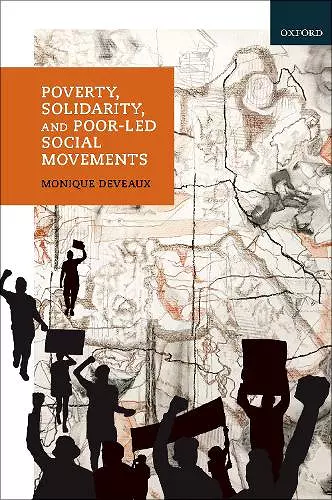Poverty, Solidarity, and Poor-Led Social Movements
Format:Hardback
Publisher:Oxford University Press Inc
Published:23rd Nov '21
Should be back in stock very soon

This is an open access title available under the terms of a [CC BY-NC-ND 4.0 International] license. It is free to read at [Oxford Scholarship Online] and offered as a free PDF download from OUP and selected open access locations. Poverty is not only about material deprivation, but also about the subordination and disempowerment of poor populations. So why isn't the emancipation and empowerment of the poor a core goal of ethical arguments for poverty reduction? Deveaux argues in this book that philosophers fail to prioritize these ends, and to recognize the moral and political agency of poor people, because they still conceive of poverty narrowly and apolitically as mere needs scarcity. By comparison, poor activists and critical poverty researchers who see deprivation as structural exclusion and powerlessness advocate a "poor-centered," poor-led, approach to reducing poverty. Stuck in an older paradigm of poverty thinking, philosophers have failed to recognize the power and moral authority of poor communities--and their movements for justice and social change. If normative ethicists seek to contribute to proposals for just and durable poverty reduction, they will need to look to the insights and aims of "pro-poor," poor-led social movements. From rural landless workers in Brazil, to urban shack dwellers in South Africa, to unemployed workers impoverished by neoliberal economic policies in Argentina, poor-led organizations and movements advance a more political understanding of poverty--and of what is needed to eradicate it. Deveaux shows how these groups develop the political consciousness and collective capabilities of poor communities and help to create the basis for solidarity among poor populations. Defending the idea of a political responsibility for solidarity, she shows how nonpoor outsiders--individuals, institutions, and states--can help to advance a transformative anti-poverty agenda by supporting the efforts of these movements.
In this volume, Deveaux challenges the all-too-common assumption that poor people are not at the forefront of movements for social change ... She insightfully writes about specific examples in various parts of the world in which those in poor-run movements employ inventive strategies. * A. Kolin, CHOICE *
Monique Deveaux makes a compelling case that perspectives of the global poor have been neglected in ways that define, frame, and present misguided solutions to the relevant issues. Recognizing the moral and political agency of the poor is not just a missed opportunity. It is an important corrective to a field that has gotten off track. This book is important reading and its theses highly plausible. * Gillian Brock, Professor of Philosophy and Ethics, University of Auckland *
By recognizing poor-led groups as agents of justice and acknowledging their central importance for challenging the institutional structures that keep some people subordinated in conditions of poverty, Monique Deveaux takes a significant step forward in advancing a transformative antipoverty agenda. This compelling book makes an important contribution to both political and normative discussions of responsibility and poverty while providing insights into the current struggles and capacities of specific poor-led social movements. * Violetta Igenski, Associate Professor of Philosophy, McMaster University *
Poverty, Solidarity, and Poor-Led Social Movements takes up the question – what would a theory of global justice look like if we took seriously the agency and insights of people in poverty. She finds that they are not merely resisting their circumstances and advocating for other political actors to help them, but rather developing and strengthening their political capacities within political community and across solidarity networks in order to bring about change locally, nationally, and transnationally. As a matter of normative theory, paying attention to their politicization of poverty, Deveaux argues, leads to different responsibilities for those with means, power, and privilege than those which are familiar in global justice theory .... Deveaux offers an important contribution to global justice theory and a model of how to do grounded normative theory without fieldwork. * Brooke Ackerly, Professor of Political Science, Vanderbilt University *
This book will act as a blueprint for future scholarly attempts to engage in these oft-overlooked nonideal questions, especially given the way it is able to combine relatively abstract political theorizing so successfully with empirical work from critical development scholars and social movement researchers. * Cain Shelley, Goethe University Frankfurt, Ethics *
This book will act as a blueprint for future scholarly attempts to engage in these oft-overlooked nonideal questions, especially given the way it is able to combine relatively abstract political theorizing so successfully with empirical work from critical development scholars and social movement researchers. * Ethics *
ISBN: 9780190850289
Dimensions: 152mm x 229mm x 23mm
Weight: 544g
280 pages